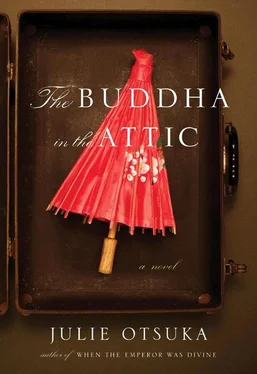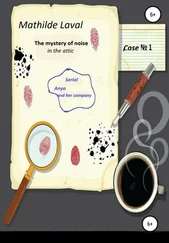A FEW OF US began receiving anonymous letters in the mail, informing us that our own husbands would be next. I’d think about getting out of town if I were you . Others reported that their husbands had been threatened by angry Filipino workers in the fields. They came at him with their vegetable knives . Hitomi, who had worked as a housekeeper at the Prince estate for more than ten years, was held up at gunpoint in broad daylight as she was heading back into town. Mitsuko went out one evening before supper to gather the eggs from her chickens and saw her laundry on fire on the line. And we knew this was only the beginning.
OVERNIGHT, our neighbors began to look at us differently. Maybe it was the little girl down the road who no longer waved to us from her farmhouse window. Or the longtime customers who suddenly disappeared from our restaurants and stores. Or our mistress, Mrs. Trimble, who pulled us aside one morning as we were mopping her kitchen and whispered into our ear, “Did you know that the war was coming?” Club ladies began boycotting our fruit stands because they were afraid our produce might be tainted with arsenic. Insurance companies canceled our insurance. Banks froze our bank accounts. Milkmen stopped delivering milk to our doors. “Company orders,” one tearful milkman explained. Children took one look at us and ran away like frightened deer. Little old ladies clutched their purses and froze up on the sidewalk at the sight of our husbands and shouted out, “They’re here!” And even though our husbands had warned us— They’re afraid —still, we were unprepared. Suddenly, to find ourselves the enemy.
IT WAS ALL, of course, because of the stories in the papers. They said that thousands of our men had sprung into action, with clockwork precision, the moment the attack on the island had begun. They said we had flooded the roads with our run-down trucks and jalopies. They said we had signaled to the enemy planes with flares from our fields. They said that the week before the attack several of our children had bragged to their classmates that “something big” was about to happen. They said that those same children, when questioned further by their teachers, had reported that their parents had celebrated the news of the attack for days. They were shouting banzais . They said that in the event of a second attack here on the mainland anyone whose name appeared on the list would more than likely rise up to assist the enemy. They said that our truck farmers were foot soldiers in a vast underground army. They’ve got thousands of weapons down below in their vegetable cellars . They said that our houseboys were intelligence agents in disguise. They said that our gardeners were all hiding shortwave radio transmitters in their garden hoses and when the Pacific zero hour struck we’d get busy at once. Burst dams. Burning oil fields. Bombed bridges. Blasted roads. Blocked tunnels. Poisoned reservoirs. And what was to stop one of us from walking into a crowded marketplace with a stick of dynamite tied to our waist? Nothing .
EVERY EVENING, at dusk, we began burning our things: old bank statements and diaries, Buddhist family altars, wooden chopsticks, paper lanterns, photographs of our unsmiling relatives back home in the village in their strange country clothes. I watched my brother’s face turn to ash and float up into the sky . We set fire to our white silk wedding kimonos out of doors, in our apple orchards, in the furrows between the trees. We poured gasoline over our ceremonial dolls in metal trash cans in J-town back alleys. We got rid of anything that might suggest our husbands had enemy ties. Letters from our sisters. East Neighbor’s son has run away with the umbrella maker’s wife . Letters from our fathers. The trains have been electrified and now whenever you go through a tunnel you do not get soot all over your face! Letters from our mothers written to us on the day we’d left home. I can still see your footprints in the mud down by the river . And we wondered why we had insisted for so long on clinging to our strange, foreign ways. We’ve made them hate us .
THE NIGHTS GREW LONGER, and colder, and every day we learned of a few more men who had been taken away. A produce distributor in the southland. A judo instructor. A silk importer. A shipping clerk in the city who was returning to his office from a late lunch. Apprehended at the crosswalk while waiting for the light to turn green . An onion grower in the Delta who was suspected of plotting to blow up the levee. They found a box of stumping powder in his barn . A travel agent. A language instructor. A lettuce farmer on the coast who was accused of using his flashlight to send signals to enemy ships out at sea.
CHIYOMI’S HUSBAND began going to sleep with his clothes on, just in case tonight was the night. Because the most shameful thing, he had told her, would be to be taken away in his pajamas (Eiko’s husband had been taken away in his pajamas). Asako’s husband had become obsessed with his shoes. He polishes them every night to a high shine and lines them up at the foot of the bed . Yuriko’s husband, a traveling fertilizer salesman who had been less than faithful to her over the years, could only fall asleep now if she was right there by his side. “It’s a little late,” she said, “but what can you do? Once you marry, it’s for life.” Hatsumi’s husband whispered a quick prayer to the Buddha every night before climbing into bed. Some nights he even prayed to Jesus, because what if he was the one true god? Masumi’s husband suffered from nightmares. It was dark and all the streets had disappeared. The sea was rising. The sky was falling. He was trapped on an island. He was lost in a desert. He had misplaced his wallet and was late to catch a train. He saw his wife standing in a crowd and called out to her but she did not turn around. All that man has ever given me is grief .
THE FIRST HEAVY RAINS blew down the last of the leaves from the trees and the days quickly lost their warmth. The shadows slowly lengthened. Our younger children went to school every morning and came home with stories. A girl had swallowed a penny at recess and almost died. Mr. Barnett was trying to grow a mustache again. Mrs. Trachtenberg was in a bad mood. She’s having her monthly . We spent long days in the orchards with our older sons and husbands, clipping twigs, pruning branches, lopping off the dead limbs that would not bear fruit in the summer or fall. We cooked and cleaned in the suburbs for the families we had been cooking and cleaning for for years. We did the things we had always done, but nothing felt the same. “Every little noise frightens me now,” said Onatsu. “A knock on the door. The ringing of a telephone. The barking of a dog. I am constantly listening for footsteps.” And whenever a strange car drove through the neighborhood her heart began to pound, for she was sure that her husband’s time had come. Sometimes, in her more confused moments, she imagined that it had already happened, and her husband was now gone, and she had to admit, she was almost relieved, for it was the waiting that was most difficult.
FOR THREE DAYS a cold wind blew down from the mountains without stopping. Clouds of dust rose up from the fields and the bare branches of the trees thrashed against an empty gray sky. Gravestones toppled over in our cemeteries. Barn doors flew open. Tin roofs rattled. Favorite dogs ran away. A Chinese laundryman was found unconscious and bleeding on the waterfront and left behind for dead. They mistook him for one of us . A barn was set on fire in a remote inland valley and the stench of dead cattle lingered downwind for days.
AT NIGHT we sat in our kitchens with our husbands as they pored over the day’s papers, scrutinizing every line, every word, for clues to our fate. We discussed the latest rumors. I hear they’re putting us into work camps to grow food for the troops . We turned on the radio and listened to the bulletins from the front. The news, of course, was not good. The enemy had sunk six more of our unsinkable battleships. The enemy’s planes had been sighted making test runs in our skies. The enemy’s submarines were coming closer and closer to our shores. The enemy was planning a combined attack on the coast from without and within and all alert, keen-eyed citizens were being asked to inform the authorities of any fifth columnists who might dwell in our midst. Because anyone, we were reminded, could be a spy. Your butler, your gardener, your florist, your maid.
Читать дальше












